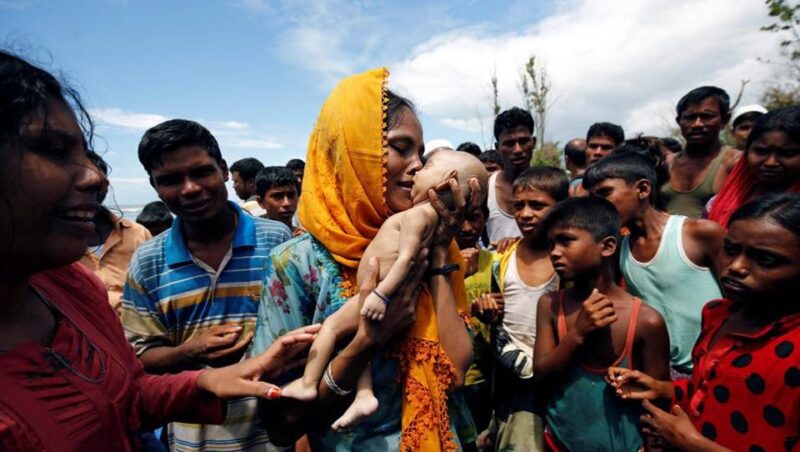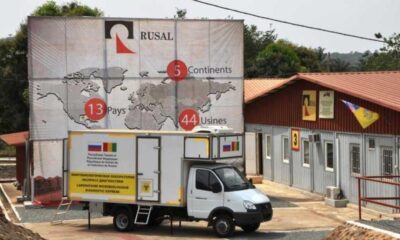Global Issues
Rohingya: A Case For Minority Groups Everywhere -By Albert Afeso Akanbi


Some sad new filtered in from Myanmar on August 25, 2017. Again we saw proof of people’s willingness, both law enforcers and breakers, to sink into the lowest depth in terms of cruelty to fellow human beings.
An attack of over 24 security sites by what Myanmar’s government called a terrorist Rohingya group that killed 12 people triggered the latest upheaval in that country.
More than 310,000 people have been reported to have fled to Bangladesh, even though the Bangladesh population has rejected them. Many are trapped on the border amid allegations of the burning of villages and extrajudicial killings by security forces. According to some sources, the death toll from the unrest in the State of Rakhine is now 3,000 if not more.
The Rohingya are a predominantly Muslim minority ethnic group in Myanmar who, because of decades-old tension with Myanmar’s leaders, have faced restrictions in participating in politics, move freely or even gain citizenship.
Many observers, especially top human right groups have described what is happening to them now as “ethnic cleaning” and “crimes against humanity”.
United Nation’s Zeid Ra’ad Al Hussein has denounced Myanmar’s actions as a “brutal security operation” targeted at Muslims.
Aung San Suu Kyi’s seeming refusal to intervene has led to speculation that the military, going with the Islamophobia of the overwhelmingly Buddhist Myanmar’s population, is trying to remove the Rohingya from the country for good. Firebrand monks leading calls for them to be pushed out as well is not helping matters.
At the moment, no one seems to be paying attention to the Dalai Lama who has called everyone involved to “remember Buddha”.
Donald Trump’s White House broke its silence recently and blamed the violence on both sides, the insurgent attacks and the ensuing violence from government forces.
Many Muslims have made a case against the hate and the persecution of the Muslim minority in Myanmar. Every right thinking person with a conscience should condemn what is happening in Myanmar today.
However, what is happening in that country is not peculiar to that country, it is not new, and as a matter of fact, it is still happening today as we speak, especially in lands with majority Muslim population.
The depressing news of the beheading of and burning alive of children reminds us that no minority group, ethnic or religious, is immune and that this sort of evil is historically speaking neither new nor remarkable.
If the world, apart from speaking, which is what it appears we know how to do best and then continue with business as usual, had taken a firm stand against many of such atrocities before and even now in other places, maybe there won’t be a Rohingya massacres today.
All over the world, throughout history, we have seen evidence that ethnic cleansing and religious persecution of minorities has taken many forms over the centuries, and depressingly, it’s still happening today before our very eyes.
Massacre and expulsion were the most common methods of religious cleansing targeting minorities in most countries. And it appears almost all religions, using their governments and people, have been perpetrators at some point.
74 SharTestifying before the United States House Foreign Affairs Committee in May 2015, Sister Diana Momeka of the Dominican Sisters of St. Catherine of Sienna, Mosul, Iraq, said the following:
But if you ask me, and I stand to be corrected, without excusing what is going on in Myanmar today, except we choose to live in denial, Islamic lands appears to have the highest records of unfair treatment of minorities.
There are over forty-four Muslim majority countries in the world stretching from North Africa through the Middle East and into Asia with a population of approximately 1.6 billion adherents worldwide today.
According to reports, in 38 of these Muslim countries, Christianity is the largest minority, larger than the Rohingya of Myanmar today. Records have shown that Christians in these lands, from Iran to Syria, Turkey to Lebanon, Egypt to Iraq, and so on, suffer severe forms of injustices perpetrated sometimes by governments themselves and most of the times by non-state actors functioning as governments.
For example, in 2014, the armies of the Islamic State in the Nineveh Plains of Iraq forced countless families from their ancestral homes. For followers of world events, we saw the unprecedented killings of innocents, desecration and destruction of historic sites of religious and cultural heritage in that country. We saw the turning of an 800-year-old house of worship into a place of torture and churches into prison. An expert noted that as a matter of fact, Christian minorities in Iraq today are living on the edge of extinction.
Yet, the most vocal voice against Myanmar today, the largest Islamic country of Indonesia kept mute in the face of this. And as we I write, this same Indonesia is currently massacring black Papua New Guineans. What makes Rohingya Muslims different from Arab Christian Minorities and Papua Guineans suffering at the hands of Muslim Iraq and Indonesia?
We know the government of Iraq is fighting these forces, does that detract from the fact that in the last decade the Christian community in Iraq has plummeted from approximately 1.5 million to fewer than 300,000 and half of those are displaced?
Truth is there is a worldwide range of policies in Islamic lands that restricts minorities, especially Christians, from living out their lives to the full like how Myanmar’s government is restricting the Rohingya Muslims today.
For example, in Muslim lands there is prohibition on public preaching, evangelism, and distribution of religious literature, exclusion of foreign missionaries, and harassment and intimidation of those who adhere to Christianity. Sometimes even mob violence and honor killings of Christians take place without serious condemnation from the likes of Indonesia.
Although Blasphemy laws exist all over the world, they are most concentrated in Islamic countries where it is severely criminal.
In Pakistan for example, an outstanding case of one Asia Bibi who is still languishing on death row since 2010 over a questionable case of blasphemy, even though many, including retired Pope Benedict XVI has called for her release, is well documented.
Turkey, formally 100% a Christian country, only recently permitted the construction of a Syriac Christian church in Istanbul since 1923.
In Egypt, church unlike mosque construction projects require a special permit from the president himself and wave of violence against Coptic Christians who themselves are at the edge of extinction in a land that was originally theirs continue to be reported.
There are countless examples like these which I believe some religious zealots, for political correctness, would condemn me for. But these are facts, and these people are human beings with rights as well, and feel pain and joy like everyone else.
Granted that there are many proponents of freedom in many of these countries, we also know that most of their populations at least tacitly support some of these discriminations. In 2013 for example, a Pew Research Center survey found that majority believe that Sharia Law should apply to all citizens, even non-Muslims.
Coming home to Nigeria, Bishop Matthew Kukah, in a talk delivered in the USA in 2016, insisted that even here, “the persecution of Christians in northern Nigeria” is as real as one can find anywhere in the Islamic nations of the world.
It is time the world takes a step further from mere condemnation to actually taking a firm stand against persecution of any kind. The powerful nations of the free world should use their influence to insist on freedom, of life, of speech, of religion, for everyone everywhere, especially in Islamic lands, who today find that their own brothers in faith are now facing in Myanmar what minorities are facing in their own lands. In the end, we are all humans and are were created equal irrespective of ethnicity and religion.
Albert Afeso Akanbi is a Novelist, Researcher, Columnist and Humanitarian. He lives in Abuja, FCT, Nigeria.
Email: afeso82@gmail.com Twitter: @afeso82 Instagram: afeso82 Blog: akanbiafeso.wordpress.com

















